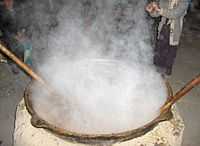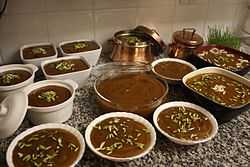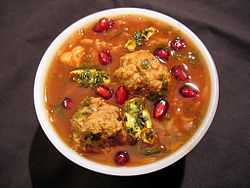Samanu
For the ancient Mesopotamian name for a disease, see
Samānu.

Cooking samanak in
Isfara, Tajikistan
Samanu (Persian: سمنو), Samanak (Persian: سمنک), Sumalak/Sumalyak (Tajik: сумалак; Uzbek: sumalak [sʉmælǽk]) or Sümölök (Kyrgyz: сүмөлөк [symœlœ́k]) is a sweet paste made entirely from germinated wheat (young wheatgrass), which is prepared for Nowruz (Persian new year) in a large pot (like a kazan) in Uzbekistan and some other countries. This practice has been traced back to the pre-Islamic Persian empire.
The wheat is soaked and prepared for days and so the entire process takes up to a week. Traditionally, the final cooking would take from late in the evening till the daylight and was a party, involving only women. This would be full of laughter and music and singing related songs . In Uzbekistan the whole mahalla, mostly women, gather near the huge pot: sit in a circle, sing songs, have fun, each of them waits for their turn to stir the sumalak. In the morning still warm sumalak is handed out to neighbors, relatives and friends. Tasting the sumalak it is necessary to make a wish, which, the locals say, will come true..[1] In Tajikistan and Afghanistan they sing: Samanak dar Jūsh u mā Kafcha zanēm - Dīgarān dar Khwāb u mā Dafcha zanēm.[2][3][4] (meaning: "Samanak is boiling and we are stirring it, others are asleep and we are playing daf").
In modern times, making Samanu can be a family activity. Traditional Samanu is made entirely of germinated wheat and water (no other ingredients). Nowadays, it is common to add a bit of flour to speed up the thickening process, although this makes the paste taste somewhat bitter and less sweet.
A plate or bowl of Samanu is a traditional component of the Haft sin table.
References
External links
|
|---|
| | Traditions | |
|---|
| | Part of | |
|---|
| | Related | |
|---|
| | Variations | |
|---|
|
|
|---|
| | Ingredients | |
|---|
| | Breads & Naans | |
|---|
| | Appetizers & Salads | |
|---|
| | Cheeses | |
|---|
| | Soups & Āshes | |
|---|
| | Dishes | |
|---|
| | Hors d'oeuvre | |
|---|
| | Sweets & Desserts | |
|---|
| | Beverages | |
|---|
| | Instruments | |
|---|
| | Related cuisines | |
|---|
| |
|


